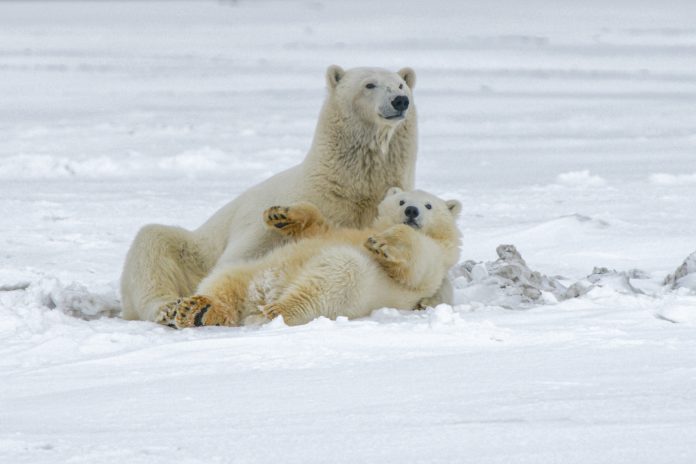New research results released by the U.S. Geological Survey contends that polar bears in Canada’s Hudson Bay region may be at risk of starvation when they are forced to find food on land, despite their ability to adapt their diets, hunting and foraging behaviors.
The findings, based on data from 20 polar bears in the Hudson Bay region, published in the online journal Nature Communications on Feb. 13, provide new insights into how these predators may struggle to cope with longer ice-free seasons brought on by climate change. Hudson Bay is a large body of saltwater in northeastern Canada, north of Ontario, west of Quebec, northeast of Manitoba and southeast of Nunavut, but politically entirely part of Nunavut.
Hudson Bay area polar bears spend about 130 days each year now on land — compared with an average of 60 days for Beaufort Sea polar bears coming ashore at three locations of the Alaska Arctic due to depleting sea ice, said Anthony Pagano, a research biologist with USGS in Anchorage.
Polar bears start showing up around Utqiagvik, Kaktovik and Nuiqsut in late August and early September, when subsistence whale harvests are occurring, Pagano said. Along with nourishment from remains of bowhead whales harvested by resident of these Iñupiat communities, they feed on land on waterfowl and berries.
Pagano said his research team plans to take data gathered from research at Hudson Bay and apply it to determine the energetic pattern of polar bears in Alaska relative to food available there, including the bowhead whales.
The Hudson Bay research results noted that between late spring and early summer that polar bears use the sea ice as a platform to primarily hunt seals when they are birthing and weaning their pups. During ice-free periods, these polar bears are thought to minimize their activity to conserve energy and either fast or consume low energy vegetation on land, although some individuals have been documented to feed on land animals. In western Hudson Bay, Manitoba, the ice-free period has increased by three weeks from 1979-2015.
Pagano and his colleagues used GPS trackers to follow 20 polar bears during the Arctic Sea ice free period of August through September between 2019 and 2022 in the western Hudson Bay region.
The monitored the daily energy expenditure, changes in body mass, diet, behavior and movement. They found that polar bears chose different strategies to reduce energy loss, including fasting, reducing their movement and eating berries and birds. These strategies were independent of age, sex, reproductive stage or initial fat levels. Researchers suggested that there is little benefit from foraging on land toward prolonging the predicted time to starvation, as 19 of 20 bears loss mass.
Meanwhile, in related litigation, the Alaska Wildlife Alliance and other groups continued to challenge a President Joe Biden administration regulation that allows oil operators to harass polar bears in the Southern Beaufort Sea and North Slope. Such harassment includes use of noise, equipment
and vehicles, as well as disrupting polar bear denning or eating sites, according to the U.S. Fish and Wildlife Service.
Oral arguments were heard on Feb. 8 before the Ninth Circuit Court of Appeals in Portland, Oregon. There is no deadline for the judges to announce their decision in the case, which was expected to possibly take months.
US Fish and Wildlife Service regulations authorize oil and gas operators in the Alaska Arctic to disturb or harass Southern Beaufort Sea polar bears while they are denning, hunting, feeding or interacting with other bears. Environmental entities who brought the litigation contend that these regulations fail to protect polar bears and their cubs from industrial activities in the Arctic, as required under the Marine Mammal Protection Act.
The public interest nonprofit law firm Trustees for Alaska filed the litigation in Anchorage on behalf of
the Alaska Wildlife Alliance, Alaska Wilderness League, Defenders of Wildlife, Environment America, and Sierra Club. Trustees is co-counseling with the Center for Biological Diversity, which represents itself and Friends of the Earth.
This story originally ran in the Feb. 16 issue of The Cordova Times.














